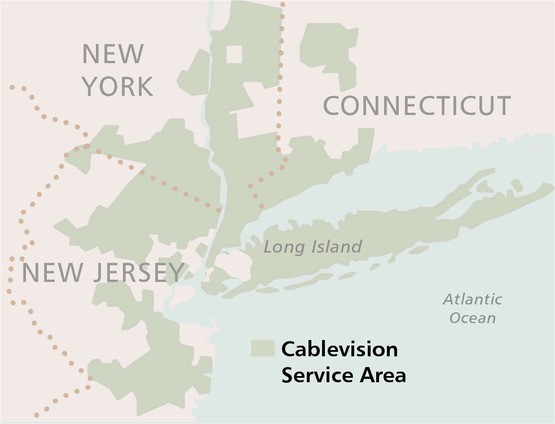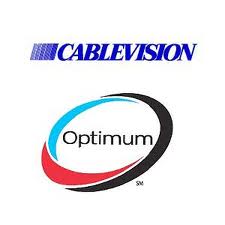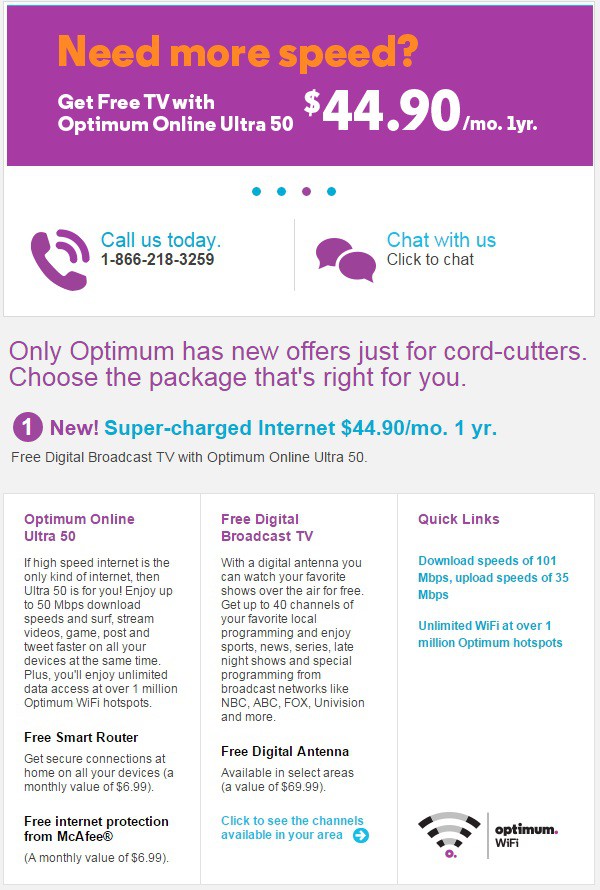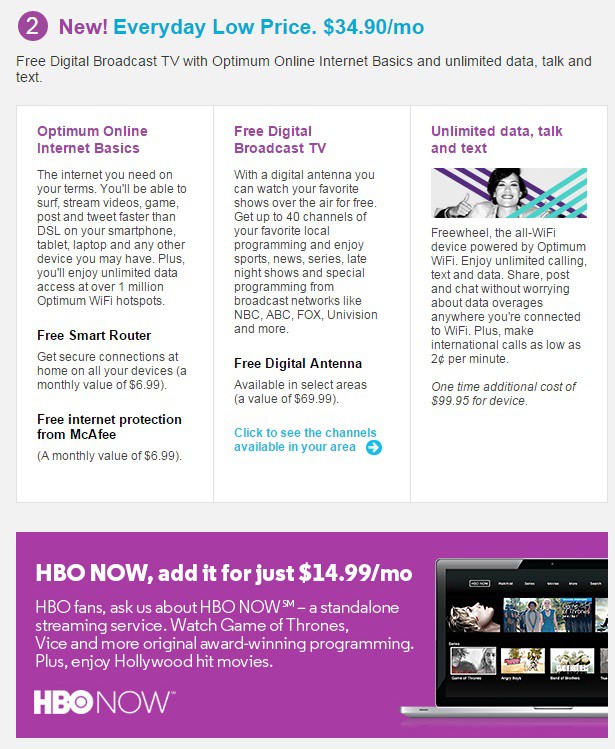 If you are a long time Optimum customer, the CEO, management, and shareholders of Cablevision would like to thank you for driving average monthly cable revenue per customer 4.8% higher from a year ago to $155.34 a month.
If you are a long time Optimum customer, the CEO, management, and shareholders of Cablevision would like to thank you for driving average monthly cable revenue per customer 4.8% higher from a year ago to $155.34 a month.
A few years ago, Cablevision developed a Stalinist approach to repeat customer promotions and retentions: nyet.
Despite mounting competition from Verizon FiOS, AT&T U-verse, Comcast and Time Warner Cable, Cablevision has held the line on repeatedly discounting its service for customers who complain their rates are too high.
“Our disciplined approach to pricing, promotional eligibility and customer credit policies has not wavered,” Kristin Dolan, chief operating officer, told investors on a morning conference call.
As a result, the average customer staying with Cablevision paid almost five percent more for service than they did a year earlier — more than $155 a month.
 “The main drivers of our increased revenue per customer came from a combination of rate increases, but also lower proportion of subscribers on promotion,” said Brian G. Sweeney, chief financial officer. “We had a number of fixed rate increases January 1 of this year related to cable box fees, an increase in our sports and broadcast TV surcharge, as well as the pass-through of PEG fees to certain customers.”
“The main drivers of our increased revenue per customer came from a combination of rate increases, but also lower proportion of subscribers on promotion,” said Brian G. Sweeney, chief financial officer. “We had a number of fixed rate increases January 1 of this year related to cable box fees, an increase in our sports and broadcast TV surcharge, as well as the pass-through of PEG fees to certain customers.”
Cablevision elected to stop competing on price in 2013, telling customers they are entitled to one customer retention deal and that is all. As a result, Cablevision has been losing customers even as it gains revenue. Although it managed to pick up 7,000 net new broadband customers during the quarter, Cablevison lost 6,000 customer relationships, 28,000 video customers — double the number from a year ago, and 14,000 voice customers. That represents 11 consecutive quarters of video subscriber losses.
The customers that remain are meeting Cablevision’s earnings expectations as others leave for better deals elsewhere.

Kristin and James Dolan
Cablevision admits many of its subscriber losses come from customers willing to shop around for a better deal. They usually find one. Although Verizon has tightened customer retention deals itself in response to Cablevision’s retention policies, Frontier U-verse in Connecticut continues to compete for new business on price, at least initially as part of new customer promotions.
Kristen Dolan argues Cablevision’s quality of service keeps customers loyal and brings many ex-customers back.
“We do a significant amount of [customer] win-backs every year and we really focus on why people are coming back and it’s not just about price,” Dolan said.
But some customers believe it is more about the price than Cablevision might think.
“The only reason I left Cablevision was because they wouldn’t negotiate and match a better deal Verizon offered me,” said Rob Hastings of Syosset, N.Y., who canceled service in 2013. “When Cablevision wouldn’t cut their price I left.”
Many of the customers coming back to Cablevision this year are, in fact, their old customers dealing with a rate reset from Verizon as promotions expire.
“When my Verizon FiOS rate shot up, I went back to Cablevision as a ‘new customer’ on a promotion,” said Hastings. “When that expires, I’ll bounce back to Verizon. Whoever gives me the best price gets my business as I am sure not going to pay extra to stay a loyal customer.”
 To further combat promotion-bouncing, Cablevision is embracing its broadband product line and marketing new cord-cutting packages to customers that offer reduced-size cable television packages and free over the air antennas for local stations. The cable company also recently announced it would offer cable customers Hulu subscriptions. Jim Dolan, Cablevision CEO, believes broadband is where the money is and customers are willing to pay higher prices to get Internet access even when video package pricing has its limits.
To further combat promotion-bouncing, Cablevision is embracing its broadband product line and marketing new cord-cutting packages to customers that offer reduced-size cable television packages and free over the air antennas for local stations. The cable company also recently announced it would offer cable customers Hulu subscriptions. Jim Dolan, Cablevision CEO, believes broadband is where the money is and customers are willing to pay higher prices to get Internet access even when video package pricing has its limits.
“You’re seeing the video product begin to lose margin and not just among the little operators like us, but even some of the big operators,” said Dolan. “Our philosophy is we think of video as akin to the eggs and the milk in a convenience store. You have to have it, but you don’t make a lot of money on it. Now connectivity is a whole other basket. It’s more like the soda and chips aisle, and if you provide great connectivity, because it provides great value to the consumer, you can differentiate yourself and you can charge more and the margins are good on it.”
Dolan doesn’t think much of his competitor’s slimmed down cable packages either.
“Verizon’s known to embellish [and] use misleading messaging in their marketing to get the phones to ring,” said Dolan. “I think that’s partially how we view these packages. I can tell you that the packages that we’re offering provide a lot more flexibility.”
To further differentiate it from its competitors, Cablevision continues to emphasize its Wi-Fi network of hotspots across metro New York City. The company also recently became the first major U.S. cable operator to launch a mobile phone service that uses its network of Wi-Fi hot spots. Although not willing to divulge customer numbers, Kristin Dolan did say unique weekly visits increased 16% on average to Cablevision’s website, presumably to explore the Freewheel Wi-Fi calling product.
Cablevision’s highlights for the first three months of 2015:
- Fiber to the Press Release: Cablevision was the first cable company to introduce 1-gigabyte residential service in the tri-state area. The service launched to a single new multi-tenant building in Weehawken, N.J. No further expansion is planned at this time;
- Discounted Internet for the Cord Cutter on a Budget: Cablevision expanded the availability of $34.90/mo Internet Basics (5/1Mbps) across its entire service area. It includes an over-the-air antenna.
- Third Party Set-Top Boxes: Cablevision is interested in providing a less expensive, open standard, set-top box platform in the future to customers that don’t want to pay for a large cable box.


 Subscribe
Subscribe The deal covers the service’s entire catalog of on-demand television shows and movies and will be available to Cablevision broadband customers online and possibly through set-top boxes for traditional cable television customers.
The deal covers the service’s entire catalog of on-demand television shows and movies and will be available to Cablevision broadband customers online and possibly through set-top boxes for traditional cable television customers.

 A week after its deal with Comcast collapsed, Time Warner Cable may be in the buying mood.
A week after its deal with Comcast collapsed, Time Warner Cable may be in the buying mood. “We found out that we were pushing subscribers back and forth on a highly promoted basis,” Cablevision vice chairman Gregg Seibert told investors at this week’s Deutsche Bank 2015 Media, Internet & Telecom Conference in Palm Beach, Fla. “I don’t want to roll a truck to you every two years if you keep going back and forth to another provider, so we’re getting rid of that lower quality, lower profitability base of subscriber.”
“We found out that we were pushing subscribers back and forth on a highly promoted basis,” Cablevision vice chairman Gregg Seibert told investors at this week’s Deutsche Bank 2015 Media, Internet & Telecom Conference in Palm Beach, Fla. “I don’t want to roll a truck to you every two years if you keep going back and forth to another provider, so we’re getting rid of that lower quality, lower profitability base of subscriber.”

 Time Warner (Entertainment): Not affiliated with Time Warner Cable, owning Time Warner (Entertainment) would gain Comcast important cable networks like TNT, HBO, and the Warner Bros. studio.
Time Warner (Entertainment): Not affiliated with Time Warner Cable, owning Time Warner (Entertainment) would gain Comcast important cable networks like TNT, HBO, and the Warner Bros. studio.